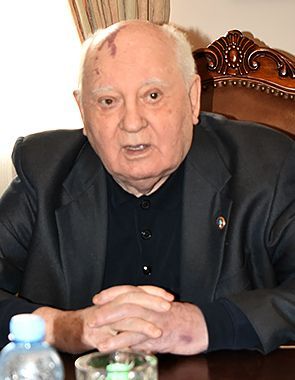Former Soviet Union President Gorbachev says Okinawa needs to have nuclear inspections in interview

Mikhail Gorbachev giving an interview. September 19, 2019, Moscow
October 28, 2019 Ryukyu Shimpo
Tsuyoshi Arakaki
Former Soviet Union President Mikhail Gorbachev, 88, who received the Nobel Peace Prize for his role in ending the Cold War, sat down with the Ryukyu Shimpo recently in Moscow for an exclusive interview.
When asked if he knew if the U.S. military had nuclear weapons in Okinawa from the reversion to Japan in 1972 through the end of the Cold War, he refrained from making a definitive statement, however he suggested the necessity for inspections, referencing former U.S. president Ronald Reagan, saying “Trust, but verify.”
The answer seemed to hint at his doubts around the denuclearization of the island after the reversion.
The U.S. was supposed to remove nuclear weapons from Okinawa at the time of the reversion, however during negotiations for the return of Okinawa, the U.S. included a clause in their written guarantee to abide by Japan’s three non-nuclear principles, stating, “that [Japan] would not check for nuclear weapons nor inspect storage facilities in Okinawa,” a term which the Japanese government at the time accepted.]
The denuclearization of Okinawa was objectively not verified.
Additionally, Gorbachev, who signed the Intermediate-Range Nuclear Forces (INF) Treaty with Reagan in 1987, noted that with the cancellation of the agreement on August 2, that there was the possibility that the U.S. would place intermediate-range missiles in Okinawa and other areas of Japan, commenting, “I feel the same way the citizens of Okinawa do,” indicating his deep concern.
Even though he is opposed to the deployment of these missiles, he suggested that Japan prepare themselves to inspect for the importation of nuclear devices.
He commented, “Okinawans fight for peace, and their opposition to the military bases is a thing worthy of respect.”
This is the first interview given by Gorbachev to the Japanese media since the annulment of the INF treaty.
Gorbachev noted that the annulment of the treaty, “is a manifestation of a dangerous and destructive trend,” indicating a sense of impending crisis.
He indicated that the context for the U.S. withdrawal from the treaty was, “an aim to achieve an absolute military superiority, even if it means removing all restrictions in the weapons field.”
He also criticized Trump’s nuclear armament expansion policy, “He is imposing his personal wishes on the world. However, this wish is a fantasy that will be impossible to realize.
The idea of a single hegemonic country in the modern world is impossible.”
Gorbachev predicted that the withdrawal from the treaty would lead to such situations as the destabilization of the global strategic balance, a new arms race, and greater chaos and unforeseeable situations in global politics, commenting, “It harms the safety of every country.
These spontaneously occurring links will lead to an out of control course.”
Furthermore, he stressed, “The key to solving security issues is not weapons, but politics.
This is an extremely important period in time. Excessive emotionality and propaganda need to be eliminated.”
He also called for the leaders of each of the major countries to “speak up in opposition to today’s status quo.”
He encouraged everyone, even ordinary citizens, to work together to push towards a more stable world order.
(English translation by T&CT and Sam Grieb)
Previous Article:WUB Okinawa discuss advancing tourism at Asia Conference
Next Article:Shuri Castle’s main hall and north hall completely burned down with fire spreading to other buildings
[Similar Articles]
- U.S. informs Russia of plans to deploy intermediate-range missiles to Okinawa in the next two years, worrying some that the base burden will increase significantly
- Mikhail Gorbachev sends message of support to the Okinawan anti-base struggle and urges that truth be disclosed about nuclear weapons in Okinawa
- Removal of nuclear weapons from Okinawa delayed its reversion to Japan
- Archival papers suggests U.S. military carried out nuclear weapon drill in Okinawa during 1960s
- Lunch break Peace March commemorates 30 years
 Webcam(Kokusai Street)
Webcam(Kokusai Street)


